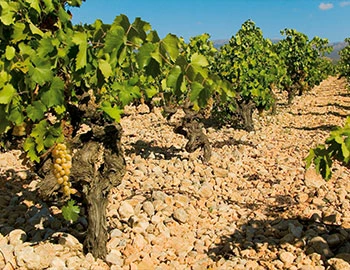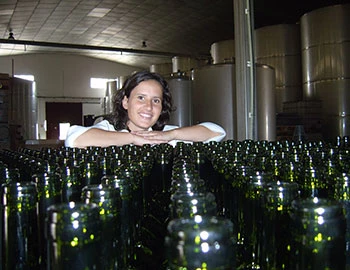Olivares Crianza 2017
Jumilla DOP, Olivares, 750 ml

| Grape variety: | Monastrell |
| Producer: | Bodegas Olivares / Paco Selva |
| Origin: | Spain / Murcia / Jumilla |
Description
A full-bodied, multi-layered and pleasing Crianza, which originates from old, ungrafted Monastrell vineyards. A balanced red wine, which fascinates already in the nose: Warming notes of blackberry jam, amarena cherries, plums and dates, coconut and sandalwood. On the palate a velvety feeling of ripe black cherries, blackberries, juniper and fragrant roses, combined with a delicate bitter note reminiscent of dark, fine cocoa powder. Every sip is pure harmony!
Attributes
| Origin: | Spain / Murcia / Jumilla |
| Grape variety: | Monastrell |
| Label: | Vegan |
| Ripening potential: | 1 to 10 years |
| Drinking temperature: | 16 to 18 °C |
| Food Pairing: | Saddle of lamb fillet with herb jus, Roast veal with morel sauce, Wild specialities, Spiced grillades, Moroccan specialities, Hearty stew with pulses |
| Vinification: | short must fermentation, fermentation in steel tank, fermentation in wooden barrel |
| Harvest: | hand-picking, strict selection |
| Maturation: | in used barriques, some months bottle storage before sale |
| Bottling: | filtration |
| Maturation duration: | 12 months |
| Volume: | 15.0 % |
| Note: | Contains sulphites |
Bodegas Olivares / Paco Selva
Monastrell
Hot-blooded Spaniard
It cannot be hot enough for the Monastrell grape. It grows around the Mediterranean, where the summers are long and hot and the winters mild. At only 200 metres in elevation, or 80 kilometres from the coast, its grapes have problems ripening. It was likely born in the Valencia region. According to written records, it was already counted among the most important varieties in 1460. Its exact origin is thought to be the Camp de Morvedre area. From there, it migrated in the 17th century to Provence, where it was christened Mourvèdre. Its wines are deeply dark, with intense blackberry aromas, rich tannins and moderate acidity. They enter into the most beautiful harmonies with other varieties from the south, such as Garnacha, Carignan or Syrah. The Mourvèdre is the main ingredient of red wines of Bandol; it also flows into the Châteauneuf-du-Pape. On the Spanish Levante coast, it is also pressed solo.
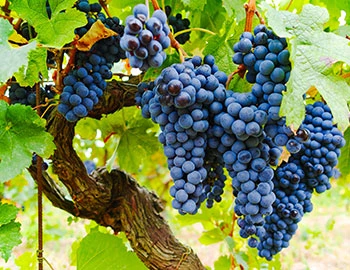
Jumilla
Jumilla: The home of Monastrell
Discoveries of grape seeds dating to the third millennium BCE indicate that Jumilla is among the oldest viticultural regions in the Iberian Peninsula. Today, more than 80 percent of the total cultivation area of 25,000 hectares is planted with the long-established Monastrell variety. Thanks to moderate watering, a tendency for early harvesting and modern cellar techniques, Monastrell wines produced here today have a great deal of fruit-accented charm and good structure.
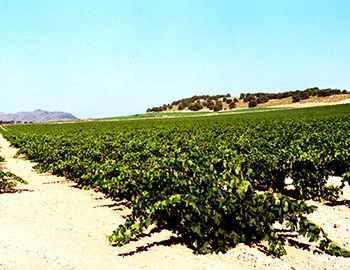
Murcia
Murcia: Home to the Monastrell variety
The city of Murcia is scarcely known outside of Spain; however, with nearly 500,000 inhabitants, it is the powerful center of a rural region. Fruit, vegetable and wine cultivation are still important economic factors here. In the three wine-growing areas located in the autonomous region of Murcia – Bullas, Jumilla and Yecla – the Monastrell variety demonstrates that it can produce wines of varying character.
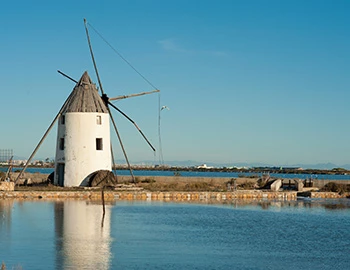
Spain
Spain – Variety and perfection
“Somewhere in la Mancha, in a place whose name I do not care to remember...,” begins Don Quixote's odyssey.
The most famous part is definitely when Don Quixote thinks windmills are his enemy and wants to fight them – until they nearly kill him. It’s possible there was a bit too much of the La Mancha wine at play. Spanish vines fight for their survival in rugged landscapes, battling fierce drought and rough soils. But they fight well.
